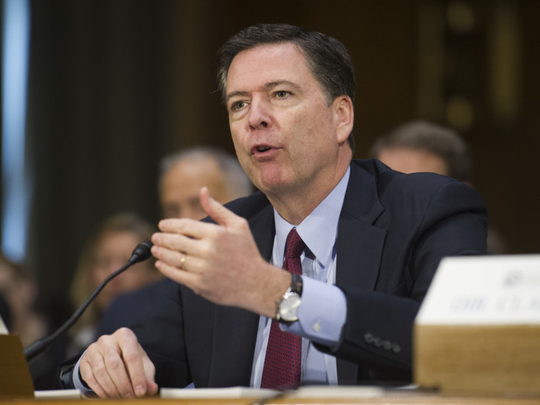
The announcement by the Justice Department’s inspector-general that his office will look into FBI Director James B. Comey’s handling of Hillary Clinton’s emails reopens painful questions about the 2016 election, but it is also welcome news. The country needs this — an objective, independent and thorough investigation of issues that have roiled the country for months and continue to stir heated debate.
The investigation will address allegations that Comey violated established Justice Department and FBI policies and procedures in his July 5, 2016, public announcement concerning the Hillary Clinton email investigation. And it will explore allegations that Comey’s October 28 and November 6 letters to Congress, which jolted the presidential election — and may have changed its outcome — were improper.
The impact of Comey’s actions can never be definitively known. But it is important, for the Justice Department and for the country, to obtain a detailed accounting of what happened and why, to assign blame where it is warranted, and to understand how similar situations can be prevented.
In addition to looking into the actions of the FBI director regarding the email investigation, the probe will look into whether the FBI’s deputy director should have recused himself from the investigation because of his wife’s political involvement; whether a high-ranking Justice Department official or others improperly disclosed non-public information to both the Clinton and Trump campaigns; and whether the timing of the FBI’s election eve Freedom of Information Act disclosures relating to Bill Clinton’s 2001 pardon of Marc Rich was based on inappropriate considerations.
But the focus of the investigation — and the public’s interest in it — will remain on what Comey did and why.
The inspector-general will have an unparalleled ability to get to the bottom of things. The investigation will be able to unravel the set of events that began with Attorney-General Loretta E. Lynch’s June 2016 Phoenix airport tarmac meeting with Bill Clinton and that ended with the November 6 letter.
The departure of department officials from government as part of the presidential transition should have little impact on access to important witnesses. Although the inspector-general cannot compel the cooperation of personnel who will, as of next week, no longer be department employees, any failure to cooperate would be highlighted in a report and would most likely lead to congressional subpoenas.
No one questions that the inspector-general has the authority to conduct such an investigation, but some wonder whether it is wise to step into matters so completely suffused with politics. These fears are understandable but misguided. Inspectors-general occupy a unique institutional position. They have dual reporting responsibilities: to the agency in which they are embedded and to Congress. Members of Congress sometimes inappropriately leverage the power conferred by those reporting responsibilities, and the unique relationships that exist between inspectors-general and Congress, by requesting investigations or other reviews that have partisan political motives.
Here, that is not an issue. The announcement made clear that this investigation has bipartisan support — it was requested by the chairman and ranking members of multiple congressional oversight committees. In the face of those requests, the better question is whether the inspector-general could afford not to do it.
Some members of the public may wonder how a political appointee in an outgoing administration can launch an investigation such as this one. That misunderstands the role of federal inspectors-general, who do not leave with the change of administrations. Inspectors-general are the only political appointees whom the law requires be selected “without regard to political affiliation and solely on the basis of integrity.” They serve for indefinite periods and may be removed only for cause and with advance notice to Congress.
The only previous effort to replace inspectors-general on a wholesale basis with the change of administrations was directed by Ronald Reagan in 1981. That did not end well — it provoked a firestorm of criticism, and Reagan ended up hiring back many of those he fired. At that time, inspectors-general were in their infancy and their roles were not as fully appreciated by either Congress or the public.
The investigation conducted by Inspector-General Michael E. Horowitz, an experienced and highly regarded law enforcement professional who has served in both Republican and Democratic administrations, will take many months. It will undoubtedly leave many people dissatisfied because it cannot change what happened. But in the end, the needs of the Justice Department and the country are better served by examining this episode, not ignoring it.
— Washington Post
Michael R. Bromwich served as Justice Department inspector-general from 1994 to 1999.












